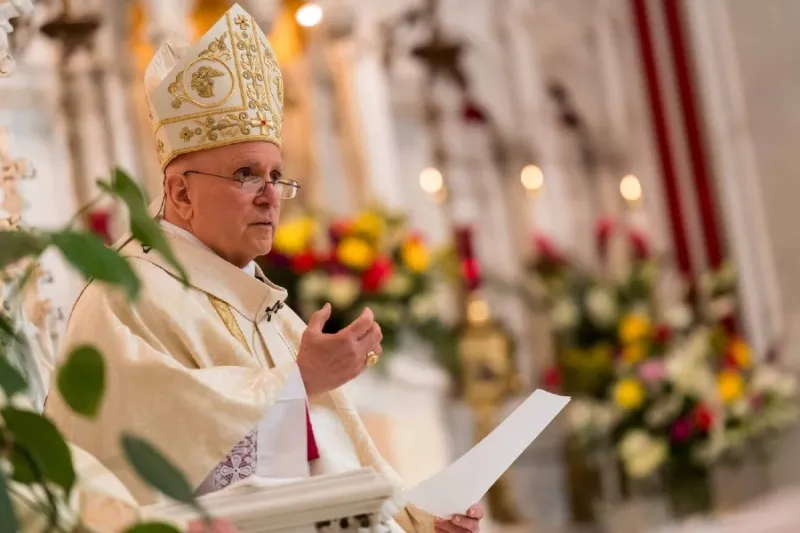
Denver, Colo., Dec 3, 2021 / 17:00 pm (CNA).
In a pastoral note for Advent, Archbishop Samuel Aquila of Denver urged Catholics to seek a way of seeing the world informed by the Bible and the story of salvation brought about by Christ’ death and resurrection.
“God is inviting us…to move beyond ideologies in order to ‘put on the mind of Christ and re-acquire a biblical worldview,” Aquila wrote in the letter.
“This proclamation of what God has done in Christ, known in theological circles as the kerygma, is meant to do more than be an interesting re-telling of events that happened in the distant past…the first element needed for the renewal of the Church is not strategic planning, changes to structure or doctrine. The initial battle is for our minds and hearts; it is a question of worldview, a question of how we see,” Aquila continued.
From the feast of Christ the King through Christmas, the entire Archdiocese of Denver is “going on retreat together,” Aquila said, with the goal of “systematically unpacking the story of salvation” through the homilies Catholics will hear each Sunday.
“Even lifelong Catholics receive Communion, baptize children, get married, and go to Mass every Sunday without ever really coming to a deep awareness of the point of it all,” Aquila said, explaining why he chose to focus on the topic of salvation in particular.
Aquila noted that “our Church no longer benefits from carrying out its life and mission in a Christendom culture…One which, while imperfect in its own ways, had an imaginative vision for reality that arose from and largely aligned with Christian beliefs.”
Instead, Christians today find themselves in a missionary context, “increasingly at odds with the broader society.”
Aquila noted that while all human beings will inevitably ask and attempt to answer life’s biggest questions, the Gospel message— the answer to all of life’s biggest questions— is not merely a result of human thinking, but rather comes from God.
“Our earth-shattering profession is that God himself has provided answers to these questions that are rooted in our being. Revelation, found in Sacred Scripture and Tradition, gives us the answer. These present not disconnected individual lives, but a story of salvation – the Father’s love for humanity,” Aquila wrote.
“More than a confusing collection of disparate books, if you have eyes to see, you discover in the pages of the Bible a narrative, told by God to humanity, of why he made us, what happened to interrupt his plan and how he came to win his world back.”
The story of salvation, Aquila wrote, is about how God created the universe out of love, how humanity was captured by sin, how Christ came to rescue humanity, and how each and every person has been given a chance to offer their own response to Christ’s love.
When Catholics see the world from a biblical perspective, “we come to consider the span of our lives as a brief but essential moment in a grand epic narrative, unfolding from long before we were born and continuing long after we go into eternity. We accept that no life is an accident; you and I have been chosen, intentionally, to play a definite part in this epic adventure.”
“We see clearly who God is: that he is Lord, and he is for us, so we can trust him. We recognize that everything he has done to rescue us means that we matter, he loves us more than we could have ever imagined. We understand that the mission and identity of the Church, in all she teaches and celebrates, are oriented to help God get his world back by rescuing his children from sin and death…to bring us home.
“We begin to see on both sides of the veil, to have an eye and a heart on eternity and to see our daily lives in light of the supernatural mysteries of our faith. Whatever difficulties life presents, we have the courage to hold fast to the truth that God is always on the move, he is not worried about the state of things, and he wins in the end.”
A temptation among many people today is to let a secular or ideological worldview inform one’s perspective of the Gospel or “what the Church should do,” adapting and changing the difficult teachings of Christ.
“Jesus does not gain a single disciple by his followers watering down or adapting his Gospel on his behalf, in order to make it, and therefore him, seemingly more palatable,” Aquila said.
“We have only to look at his teaching on the Bread of Life in John 6 as confirmation. Jesus told his followers the Eucharist was his body and blood and he let them walk away when it wasn’t something they could accept.”
Aquila concluded by quoting Pope Francis’ exhortation Evangelii Gaudium: “Nobody can go off to battle unless he is fully convinced of victory beforehand. If we start without confidence, we have already lost half the battle and we bury our talents. While painfully aware of our own frailties, we have to march on without giving in, keeping in mind what the Lord said to Saint Paul: ‘My grace is sufficient for you, for my power is made perfect in weakness’ (2 Cor 12:9). Christian triumph is always a cross, yet a cross which is at the same time a victorious banner borne with aggressive tenderness against the assaults of evil. The evil spirit of defeatism… is the fruit of an anxious…lack of trust,” (Evangelii Gaudium 85).
If you value the news and views Catholic World Report provides, please consider donating to support our efforts. Your contribution will help us continue to make CWR available to all readers worldwide for free, without a subscription. Thank you for your generosity!
Click here for more information on donating to CWR. Click here to sign up for our newsletter.





Leave a Reply